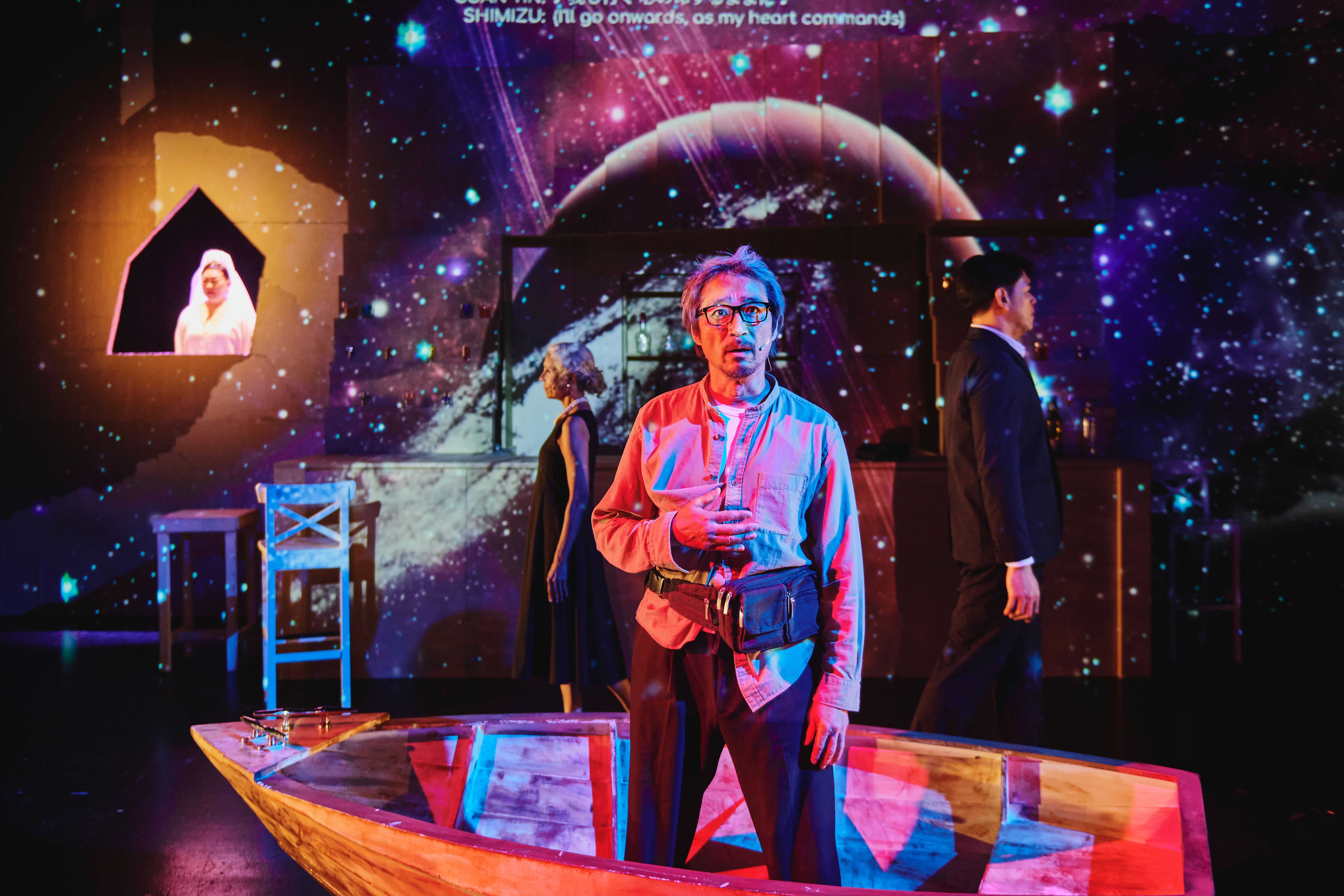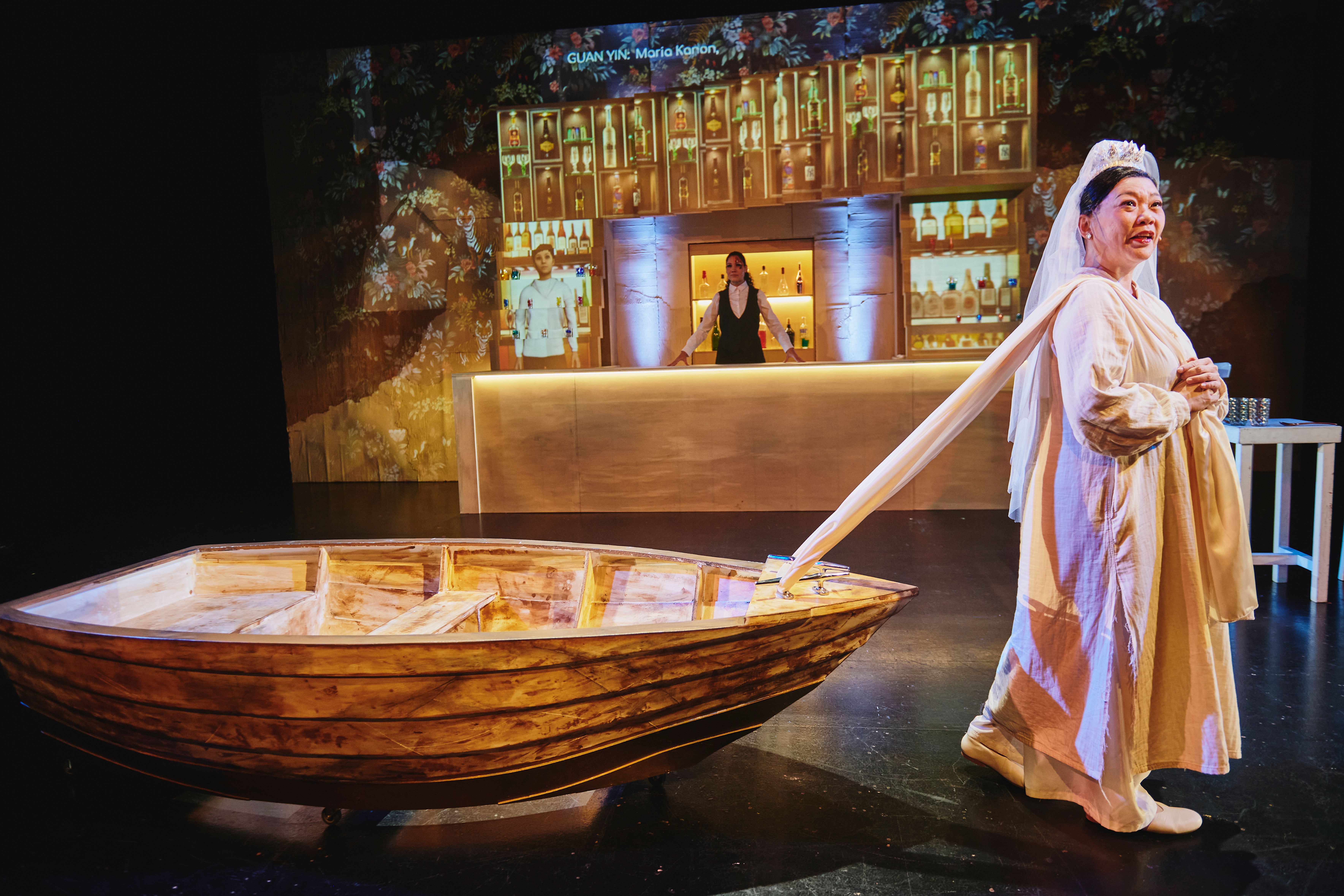剧评:Hi, Can You Hear Me?
照片提供:Tuckys Photography
在魔鬼面前起舞—— 观"Hi, Can You Hear Me?"
社交媒体的即时性,让世界各地的人们都能在第一时间目睹世界各个角落天灾人祸的惨况。我们都有转发讯息的能力,但同时也因此身感无力。在巨大的灾难面前,我们的能力太有限,我们的悲愤太无用,我们的悲悯太廉价。必要剧场原创剧“Hi, Can You Hear Me?”(以下简称“Hi?”)开场时,演员(Sharda Harrison)向观众提出了问题:在灾难之下,艺术工作者能做什么?
“Hi?”有几条叙事主线同步进行,以跳叙(不按照时间顺序揭示情节与角色)的方式,打破时空的规律,让观众仿佛置身爱丽丝梦境,全程沉浸在古怪与不安的氛围之下。剧情的支离破碎,似乎反映着角色千疮百孔的心理状态。新加坡最后一只老虎(Sharda Harrison饰演)被人类射死后,被困在了中阴之间(竟然是一间酒吧),成了调酒师。来自不同时空,面对生活困境的不同的人们,都会到她的酒吧喝酒;而她只能为这些人调配饮料,听他们述说他们的困苦。一位日本的独居老人(Doppo Narita饰演)患上了失智症,面对记忆的消逝,他只能不断述说自己的往事,重温曾经有过的亲情与爱情。一对外遇对象(Rodney Oliveiro 与 Sukania Venugopal饰演)相处十年后,终于必须面对分离的抉择,却忽然不太确定他们彼此之间是否真的没有任何爱意。
所有人物都在情欲之间剧烈挣扎。剧中最无苦无痛的,应该是观音—— 她一次一次下凡去经历苦痛,遭受惨烈的死亡(如化身为被父亲处死的妙善公主、如化身为被猛虎吃掉的小孩),又一次一次悠然回来中阴之间的酒吧里当驻唱歌手。观音有千万化身,所以她的身份也最具流动性:她随时用不同语言、不同口音说话;她吟诗、甚至也引用圣经的词句。
舞台上有一小舟,非常耐人寻味。有时一些角色会爬倒小舟里坐,然后又爬出来。有时他们会慢慢推小舟,很多时候又无视小舟的存在。
全剧却没有任何水。剧里没有河流,小舟顿时失效无用,角色坐在其中,哪里都去不了。调酒师虽然为失意困顿的人们调酒,但没有人因而获得救赎。观音手中也没有救济人类的甘露水…… 多媒体为观众显示了千百个观音,但那些观音或是静静坐着,或是默默舞动着千只手臂⋯⋯ 一如人们对艺术工作者的印象。
当整个世界经历着不止的战事、无情的天灾,这些角色该何去何从,这个世界该何去何从?剧组抛出这样的问题以后,并没有赋予答案,却也为观众揭露了一些可能性。整齣戏里,音效设计师Jevon Chandra 都在场上,现场为戏配乐、伴奏。每当角色陷入纷争,Jevon就会弹奏音乐,观音就会唱歌。在音乐中,所有的纷争与痛苦会暂时止息(老虎和男人互相厮杀,歌曲一起,两人就开始跳起双人舞;失智老人情绪崩溃,歌曲一起,所有演员忽然一起出场跳舞,连崩溃的老人也从地上跳起来开心起舞)。
为什么非要安排音乐设计师与角色们一起出现在舞台上?音乐—— 以及艺术—— 是否就是暴力的润滑剂,是否就是场上缺失的水?剧名“Hi, Can You Hear Me?”或许本是从疫情时期无数的Zoom 会议中常说的话语化出来的剧名,但是否也可解读为音乐/艺术对人类的呼唤?
在暴力与恶的面前,音乐/艺术多无力,也多让人充满希望。
照片提供:Tuckys Photography
必要剧场的“Hi?”把艺术工作者深切的质问,包装在看似荒谬无厘头的表演中,让观众在解读戏剧时有层层解剖的乐趣。剧中演员们的精湛演出,是“Hi?”的一大卖点。几年没出现在舞台上的Zelda Tatiana Ng 和 Rodney Oliveiro让人想念,表现亮眼有惊喜。Doppo Narita 与 Sukania Venugopal 对角色的细腻诠释叫人动容,他们的每一举手投足都是戏,每一眼神都叫人对他们情不自禁。Sharda Harrison的形体表演太让人着迷,这样一个老虎角色的无奈、悲伤与痛苦,让她演绎得丝丝入扣。
走出剧院,我一直想着剧里反覆出现的诗“The Tyger”—— 诗人William Blake以此诗质问创造万物的神为何也创造出邪恶。是的,善与恶会永世存在,音乐/艺术的确无法解决恶的因果,一如观音无论有再多的化身也都无法让全人类从罪恶中解脱。但”Hi?”仿佛在向冥冥中的造物者许愿,希望音乐/艺术能让我们的仇恨少一些些,愤恨少一些些。
我们从没指望艺术能够结束一切的恶。但因为艺术,我们拥有唱歌与跳舞的力量—— 有了艺术,我们至少可以一边起舞,一边欣赏魔鬼的一脸错愕。
关于演出:2024年3月21日,8PM,滨海艺术中心小剧场,必要剧场呈献
点击阅读场刊
Dancing before the devil
Theatre Review: Hi, Can You Hear Me?
Translation by Melissa Lim
The immediacy of social media has given a global audience the opportunity to visually experience a multitude of catastrophes and disasters in real time. We now possess the ability to repost and forward messages, but in doing so, it also leaves us feeling helpless. We are nothing but powerless before these massive calamities. Our grief and rage are futile, our sense of compassion and empathy cheap. The Necessary Stage’s Hi, Can You Hear Me? (abbreviated as Hi? hereon) opens with actor Sharda Harrison directly posing this question to the audience: in the face of these tragedies, what can arts practitioners do?
Hi? depicts several concurrent narrative threads, and the play adopts a non-linear presentation that leaps across time and space, creating fractures that immerses the audience in a strange and restless dreamscape akin to that in Alice in Wonderland. The narrative fissures seem to echo its characters’ flawed psychological states. After being shot by humans, Singapore’s last tiger (played by Sharda Harrison) is trapped in limbo (interestingly this purgatory is portrayed as a bar) and becomes a bartender. Different characters from various time and space, each with their personal adversities, drift to her bar to drink. Yet she can only mix cocktails for them whilst listening to their sorrows.
An elderly Japanese man (played by Doppo Narita) with dementia lives alone, and he grapples with the loss of his memory by reliving his past, nostalgic for a love and family he once had. A pair of lovers (played by Rodney Oliveiro and Sukania Venugopal) who have sustained an affair over ten years are finally faced with an ultimatum to part, yet are suddenly stricken with the notion of being unsure if there was any love between them in the first place.
These characters all seem to be in some form of emotional anguish. The sole character in Hi? who possesses the least distress is Guan Yin. She descends to earth time and again to experience pain and tragic deaths (from Princess Miao Shan who was put to death by her father, to a child savagely eaten by a tiger), and constantly revisits the state of limbo that is the bar as a singer. As Guan Yin possesses thousands of incarnations, her identity is also the most fluid amongst the characters: she speaks in different languages and accents, recites poetry and even quotes from the Bible.
A small boat that sits on stage serves as an intriguing visual point. At times, some characters would clamour onto the boat; at other times, they climb out of it. They take turns to slowly push the craft across the stage; yet oftentimes they seem oblivious to its existence.
Yet within the whole play, there is no sign of water. By extension, the boat is rendered useless without a single river in the play. As the characters take their places in the craft, they too can go nowhere. The bartender continues to prepare drinks for those who are distraught or who are literally losing their minds. Despite that, no one encounter deliverance or redemption. Guan Yin does not have the divine nectar of life in her hands to save humanity… The multimedia in Hi? depicts a multitude of Guan Yin figures, yet they were all just quietly sitting in meditation, or silently waving their thousand arms… and this bears an uncanny parallel to the impression that many may have of arts practitioners.
As this world plummets into endless wars and ruthless natural disasters, where should this characters in Hi? go? Where should this world head towards? The collaborators behind Hi? broach this question and offer no firm answers, but they do allude to some possible responses for the audience. Throughout the play, sound designer Jevon Chandra is placed conspicuously on stage as he performs live. Each time the characters hurtle towards conflict, Jevon would play music as accompaniment as Guan Yin sings. As the music plays, the combat and pain would cease momentarily. For instance, the battle between the tiger and man would morph into a dance for the duo. As the elderly man with dementia crumples into his emotional anguish, the music begins and all the actors suddenly take to the stage to dance—including the elderly man, who joyously joins in.
What was the rationale behind placing the sound designer alongside the characters on stage? Is music—and art—a salve for such violent times, or effectively the water source that is not present on stage? The title of the play Hi, Can You Hear Me? could have been an oft-heard line uttered in many a Zoom meeting we have had during the pandemic. Yet could it be interpreted as a cry to humanity from music and art?
Music and art may well be impotent against violence and evil, but they can offer hope to humanity.
The Necessary Stage’s Hi? inserts this deep inquiry about the role of arts workers into a seemingly absurdist production, providing the audience an opportunity to read into its multiple layers of meaning. Furthermore, one of Hi?’s greatest delight is the fantastic performances by the actors. Veteran actors Zelda Tatiana Ng and Rodney Oliveiro have not graced the stage for some time, and their brilliant performances here reminded us of how much they have been missed. Doppo Narita and Sukania Venugopal’s intricate interpretations of their characters were incredibly moving—their every gesture and every gaze were mesmerising. Sharda Harrison’s physical performance was simply captivating, and only she could have portrayed the tiger’s complicated sentiments—helplessness, despair and sorrow—with such arresting dedication.
As I left the theatre, I found myself pondering about William Blake’s “The Tyger”, which appeared in the play in several instances. In the poem, Blake questioned how a God who was the creator of all beings could also bring forth evil into the world. Yes, good and evil will aways exist. And indeed, just like how Guan Yin could not deliver mankind from sin despite her many incarnations, music/art can offer neither solutions to the root causes of evil nor that which evil foments. However, what Hi? appears to proffer is hope in the dark: that perhaps music/art can somehow attenuate our animosity and appease our rage.
We hold no expectation for art to put an end to evil. But because of art, we possess the power of song and dance. Because of art, at the very least, we can gaze into the bewildered face of the devil as we take to our feet and dance.
The above review is written after the performance on 21 March 2024, 8pm at Esplanade Theatre Studio and presented by The Necessary Stage.
Click here to read the programme
Written by A Yagnya
Co-Directed by A Yagnya and Alvin Tan
Performed by Doppo Narita, Rodney Oliveiro, Sharda Harrison, Sukania Venugopal, and Zelda Tatiana Ng
Dramaturg: Sindhura Kalidas
Set Designer: M. Nurfadhli Jasni
Multimedia Artist: Brian Gothong Tan
Lighting Designer: Yo Shao Ann
Sound Designer: Jevon Chandra
https://www.necessary.org/main-season/hi-can-you-hear-me






Comments
Post a Comment